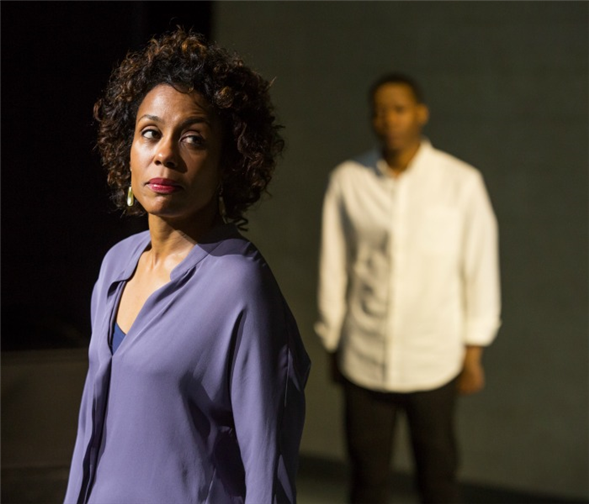Translate Page

Why directing Pipeline is so personal for Lileana Blain-Cruz
---
Dominique Morisseau's new play Pipeline explores the school-to-prison pipeline phenomenon, which disproportionately impacts young male students of color. The drama frequently reminds viewers that we are all part of the problem. The house lights rise slightly whenever Nya -- an African-American high school teacher and mother to a teenage son -- addresses the audience as though we're fellow characters like her students or the school board. This device pulls us into the story, effectively shattering the fourth wall.
Director Lileana Blain-Cruz notes that the stadium-style seating in Lincoln Center Theater's Newhouse Theater helps to facilitate this audience pseudo-participation. "The Mitzi Newhouse is actually kind of modeled off of the Greek amphitheatres," she says. "I felt like that was appropriate, that there's a nature of Greek tragedy inside of Pipeline in which you understand everyone's arguments and yet they're all in the most impossible circumstances. What do you do when you find yourself in these impossible circumstances that are part of a larger institutional system that we are all participating in?"
That question becomes provocatively personal in Pipeline. Nya teaches at an inner-city public school but sends her son Omari (Namir Smallwood) to a private prep school. After a violet incident, he's threatened with expulsion, and Nya begins to unravel.
Ancient Greek theatres served as sites for public debates as well as shows, and Blain-Cruz points out that the Newhouse "operates almost like a kind of forum." So it's fitting that Pipeline is both a play and a call for change.
"How to involve the audience inside of this very specific microcosm of a community in the play, that became my point of entry as a director," says Blain-Cruz. When Nya engages with the crowd during her lesson on Gwendolyn Brooks' 1960 poem "We Real Cool," "the audience is constantly being reminded that we are part of this larger history, that it's a communal history. It's not just a character named Nya and her son Omari; it's American history that we are all a part of. This is all of our legacy. How do we take responsibility for that? And how do we make space for the lives of the people Dominique is representing on stage?"
By finding ways to draw the audience into the show viscerally, Blain-Cruz is utilizing theatre's ability to make the political personal. While high-profile cases of violence against black men continue to dominate the news cycle, Blain-Cruz's staging of Morisseau's timely play brings us face-to-face with that reality -- and what we might be able do about it.
For Blain-Cruz, that's something she thinks about constantly. She notes we're living "in a time when young black men are being killed in the streets. I think about my brother and my cousins who are young black men growing up in the world right now. I worry about them every day."
But she's not without hope. And Blain-Cruz believes that "making space" -- which is powerfully literalized in the show with the marginalized Omari dwarfed at the center of a sparsely furnished arena -- is key. "We are literally creating a space from which to see people," she says. "To see people and understand people."
---
Jack Smart is a Brooklyn-based writer, pop culture nerd, and Awards Editor at Backstage. Follow him at @JackSmartWrites. Follow TDF at @TDFNYC.
Top image: Karen Pittman and Namir Smallwood. Photos by Jeremy Daniel.
TDF Members: Go here to browse our latest discounts for theatre, dances, and concerts.